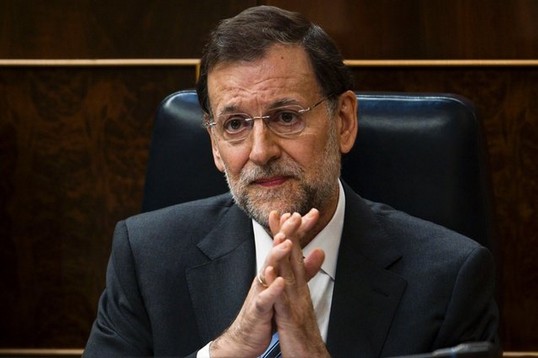BRUSSELS (AP) — The head of the European Union’s executive body urged the region’s leaders on Wednesday to show the world that they were ready to move closer together to resolve their debt crisis.

Jose Manuel Barroso told the European Parliament that the continent is facing a “defining moment,” and he said the only way to save the union was to make it stronger and tighter. He spoke as concerns that the group of the 17 countries that use the euro could soon fracture and that more countries might ask for a bailout rose to a fever pitch.
Borrowing costs for Spain have shot up in recent days as investors steered clear of buying its bonds. Now Italy has been caught up, with markets worried that it will be the next eurozone economy to struggle with debts and be ultimately pushed into asking for a bailout.
Greece’s fate hangs on the outcome of an election this weekend that could see a party that wants to renegotiate — or even abandon — the country’s bailout win big. But if Athens strays from the commitments it made to secure its rescue, it could be forced to leave the euro. That would likely deepen the crisis everywhere.
Barroso added that giving Brussels more oversight of Europe’s banks and budgets would also help strengthen the region. “For the long term, I will urge the European Council to take concrete commitments towards a fully developed economic and monetary union and a process that maps out the steps how to get there,” he told representatives in Strasbourg, where the European Parliament meets.
“More than ever we need a strong ambition for Europe.” Here is a look at the problems facing Europe: —SPAIN The country is looking increasingly fragile after an agreement to bail out its banks this weekend seemed to deepen rather than alleviate market concern about the state of its finances. Eurozone leaders have offered to put up as much as €100 billion ($125 billion) to shore up Spain’s struggling banks, which are saddled with massive amounts of bad loans and lossmaking property assets.
There are fears, however, that because the government will be responsible for repaying the banks’ rescue loans, the deal will add to public debt, hurting confidence in the country’s ability to finance itself and forcing it into the kind of bailout asked for by Greece, Ireland and Portugal.
These concerns have pushed Spain’s borrowing costs even higher. On Tuesday, the interest rate — or yield — on Spain’s 10-year bond hit its highest level since Spain joined the euro in 1999. It has since fallen back to 6.71 per cent, still perilously close to the 7 percent mark that forced other countries to seek full rescues.
Spain’s prime minister, Mariano Rajoy, added his voice to the call for greater European fiscal and banking integration. He told the country’s parliament that Europe now faced a key issue “which is the subject of liquidity, debt sustainability, and that battle has to be waged in Europe.”
—ITALY With Spain teetering, investors are now wondering which country might next find itself in the eye of the storm. The answer is Italy. While the country’s economy is larger than Spain’s and its banks are in better shape because they didn’t suffer from a real estate bust, Italy’s economy is shrinking. This is making it increasingly difficult for the government to chip away at a mountain of debt.
At a short-term bond auction on Wednesday, the effort of seven months of reforms and austerity measures was seemingly wiped out when Rome was forced to pay interest rates close to levels last seen in December.
Again, high borrowing costs are at the heart of Europe’s debt crisis and are what force countries to seek bailouts. The problem with Italy and Spain, however, is that their economies are so big — they are the third and fourth largest economies in the 17-country eurozone — and it’s unclear whether Europe has enough cash to rescue them.
—GREECE Bank officials in Greece have revealed that customers, unnerved by political instability and talk of a potential exit from the euro, are continuing to pull out their savings out of local lenders. Officials there said the pace of withdrawals was not one that would destabilize the battered banking sector, but much will hinge on Sunday’s elections.
Outflows spiked just after the inconclusive May 6 election, and have picked up in recent days ahead of Sunday’s new vote, one official said Wednesday. Since the Greek debt crisis broke in late 2009, depositors have slowly pulled some €72 billion ($90.24 billion) from local lenders, with total household and corporate deposits standing at €165.9 billion ($207.94 billion) in April, according to the latest data from the Bank of Greece.
Deposit outflows eased in March and April, following Greece’s second international bailout and a massive writedown in its privately-held debt, but resumed in May after the election results. In a few days after the May 6 ballot, some €800 million ($1 billion) were pulled out.
—GERMANY Barroso’s prescription of more union to solve the crisis also came under threat from Germany, Europe’s largest economy, on Wednesday. Chancellor Angela Merkel and the country’s opposition leaders failed to reach an agreement on a European growth initiative in a new round of talks, according to participants. That failure will hold up passage of a new Europe-wide treaty designed to ensure countries keep their budgets in check.
Merkel had been one of the main architects of that treaty, which for a time brought a calm to the crisis. That she is struggling to get the support of her own Parliament for it underscores how difficult any progress in Europe is.
Germany’s Finance Minister Wolfgang Schaeuble on Wednesday stressed Europe must take advantage of the crisis and make bold steps to deepen its integration. “The time for large steps is now,” he said.





